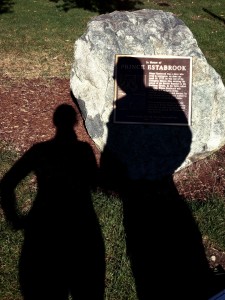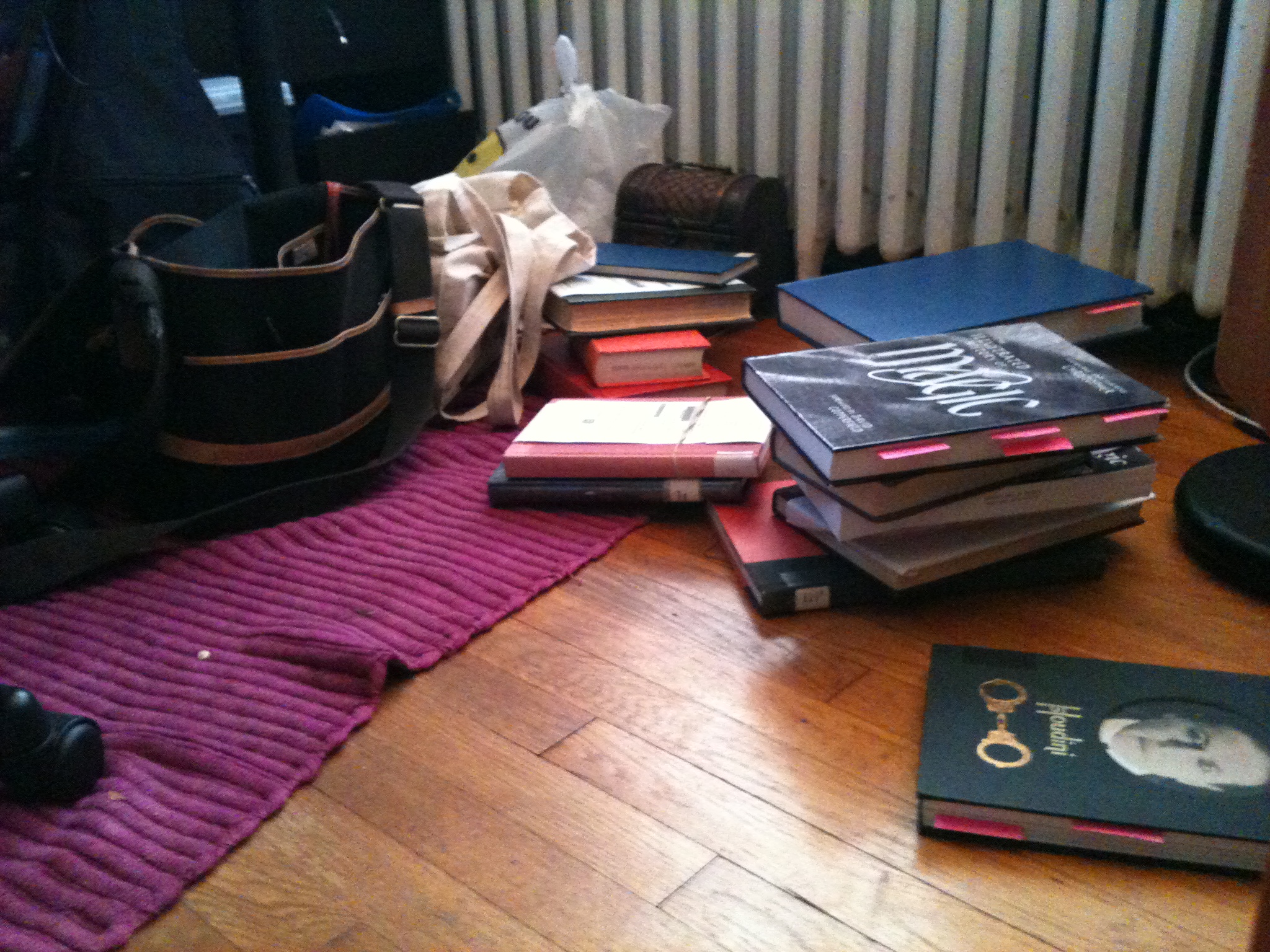Hello everyone!
I’m back from “Spring Break”. I put this phrase in quotation marks because it was neither Spring, nor a Break. I did make a trip up to Quebec with my best beloved just to get away from town for a while. Think about that: Canada. In March. It was very cold.
It was, however, absolutely beautiful. We got to see the Hôtel de Glace (the only ice hotel built in North America by the way; it’s built and re-built every year in January and only open for a few months. They build it differently every year so each experience is one-of-a-kind. Yes you can actually stay the night; no we didn’t; and after being there for a few hours I’m extremely happy with that decision since brrr it was COLD). The rivers

View from the old city walls
were almost completely frozen over, if not solid enough to spot trucks driving over them. We got to see the ice flows (just beautiful) and the sugar loaf at Montmercy falls. All in all, being in the old city was like being in Europe; complete with getting to practice my French skills (…there’s nothing like the opportune moment to realize that you don’t remember the word for “check” as in “may we have the check, please?”… it’s “chèque” by the way… ain’t that embarrassing?) This mini-vacation definitely wasn’t a “spring-like” pursuit; but the added bonus is that it was SO BLOODY COLD that when we returned, even the Massachusetts I-won’t-ever-give-up winter felt warm by comparison. Temperatures have decided to plummet today and we’re expecting more snow on Wednesday. Because New England is a vicious, vindictive, vermin.
It also wasn’t much of a break. Though I did take a long weekend away, when I returned there was a backlog of e-mails, projects, lesson plans, and various things which required my attention. I spent the tail half of the week scrambling to get back on top of things before classes started again (today). I also managed to book two more classes to teach this semester on top of my current coarse load (my OSHER class, of course, and I’m also going to be teaching stage combat workshops for the kids over at Charlestown Working Theatre… this is extremely exciting because what could be more fun than spending a few hours every week teaching kids to safely beat each other up? Oh, by the way, I get paid to do this. This is my job. Go ahead and be envious, I’ll understand).
Additionally, I’ve got two more FD gigs lined up (the main stage at Tufts has asked me back for their third and final production this year – OR directed by Sheriden Thomas, and I will also be working with Zeitgeist Stage Company on their up-and-coming show Good Television).
So, really, I’m hitting the ground running here.
As an aside: I recently received an e-mail from a reader asking about the proper pronunciation of the word “dramaturge”. Here’s the e-mail:
Please help us Dani. Brother and I want to know the correct and widely accepted pronunciation of the word dramaturg? Is it with a soft g as in the French interpretation typically spelled with an e at the end or is it with a hard g as one would assume having come from the Greek root? Thank you for your time and assistance in clearing this up for us. We will submit to your opinion.
Never fear, dear reader; since this is one that I deal with on a daily basis, let’s have a chat about it now.

Since I don’t have a picture of me duking it out with someone in a sumo suit, you’ll have to settle for a shot of the “Frozen”-themed room at the Ice Hotel
As you note in your e-mail, “Dramaturge” is from the French work “Dramaturge” and, before that, the Greek word “Dramaturgos” (“Drama” meaning exactly what you would expect it to, and the suffix “-ergos” meaning “worker”).
Also as you seem to be experiencing, there’s actually a great deal of dissention about the pronunciation of this word. Since it’s from French, you would expect it to be pronounced with the soft “g” (the terminal “e” also indicates this pronunciation), but some scholars prefer to spell it “Dramaturg” and pronounce it in the German way using a hard “g”. This quirk is in honor of Gotthold Ephraim Lessing, author of the Hamburg Dramaturgy (a compilation of essays written by Lessing over the course of his career first as the lead critic of the national theatre in Hamburg then as various other theatre-type-things over the course of the eighteenth century) who is often considered the father of modern dramaturgy.
I, personally, tend to pronounce it the German way (though it depends on what day you catch me and if I’ve been translating Molière recently). Unfortunately, I have to tell you that both you and your brother are correct; if you walked up to a group of Dramaturges (with a few Dramaturgs mixed in) and each of you took a turn saying it in your own way, you’d both be accepted amongst the group and invited to join the communal festivities beside the fire noting the disparagements between bad Hamlet quartos while being offered egregious amounts of wine to drink. I should add the caveat that, in the plural, it’s more elegant to use the hard “g” and so that generally is what happens (though, really, when do you run into a group of wild Dramaturgs? The only time we band together is at conferences, and then usually it’s so we can acquire food without being thrown into nearby dumpsters by the local sports teams who smell our nerdom from a block away and have trouble repressing high school instincts once those pheromones are in the air).
I hope this is helpful even though it’s not conclusive. If you’d like a better way to settle this between you two, I often find that these sorts of arguments, where neither party is correct nor wrong, are best solved using inflatable sumo suits and copious application of ridiculous sound effects. After all, it’s very hard to argue victory when you’ve been tackled to the ground and piled on top of. If you do decide to fight for glory and honor this way, please send a picture. Nothing would make my day more delightful than a (safe) knockdown, drag-out fight to the finish over quirks of the English (….French…. German… Greek….) language.








